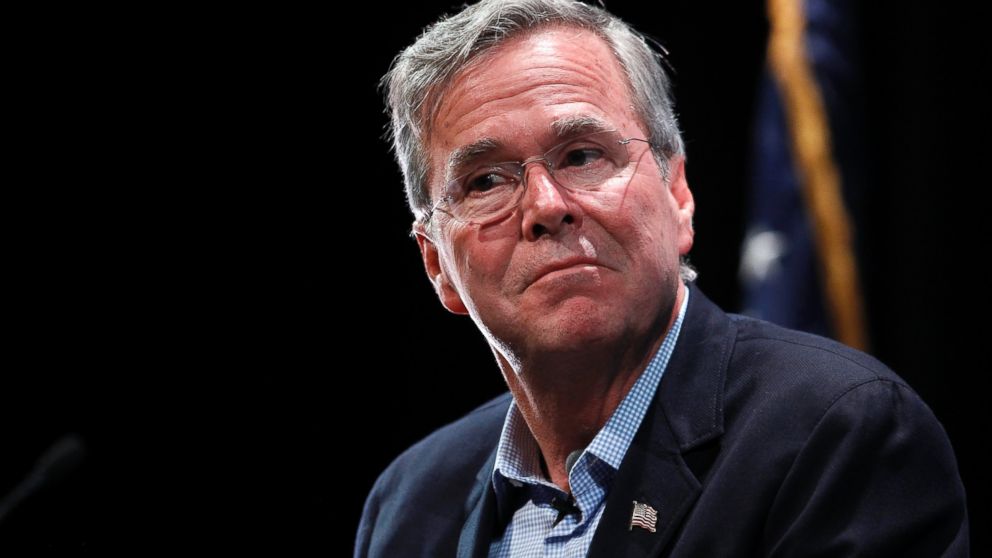GOP Candidates Get Personal on Addiction Struggles
Republican presidential candidates open up on their families' struggles.

NORTH CONWAY, N.H.— -- It was the final question of the event.
Former New Hampshire State Rep. Steve Steiner stood up and told Jeb Bush about his son who died of an overdose in Florida. He recounted another experience giving CPR to a man he found slumped over on the highway who had gone into cardiac arrest, presumably drug-related.
Bush breathed deeply. "First of all, my heart goes out to you about your child," he said. "I have had personal experience with this, and just the heartbreaking nature of someone you love with all your heart, who is afflicted with addiction or even worse dies, it’s just …"
He paused, a sigh escaped him, his voice filled with emotion: "It's horrible."
He was speaking of his daughter, Noelle, who was arrested in 2002 at the age of 24 for trying to fill a fraudulent prescription for Xanax and later served some time jail after she was found with crack cocaine during a stay at a drug rehabilitation center.
Bush is just one candidate whose personal experiences with addiction can be heard out on the campaign trail. Those vying for the presidency move frequently through New Hampshire, where the heroin epidemic has beset this key voting state and, thrust, drug addiction into the political sphere.
New Jersey Gov. Chris Christie, despite sinking poll numbers, made comments on the topic that reached viral proportions. While campaigning in Belmont, New Hampshire, Christie told a story of his late mother’s smoking addiction.
"We know the lung cancer was caused by the smoking," Christie said. "But no one came to me and said, 'Hey, listen, your mother was dumb. She started smoking when she was 16. Then after we told her it was bad for her, she kept doing it. ... She's getting what she deserves.' No one said that."
He then delved into an emotional story about a law school buddy whose career and life was cut short after he became addicted to prescription drugs.
"Somehow, if it's heroin or cocaine or alcohol, we say, 'They decided it. They're getting what they deserved,'" he said, as part of a Huffington Post Web series.
"It's easy to be pro-life for the nine months you're in the womb. They haven't done anything to disappoint us yet. They're perfect in there! But they get out, that's when it gets tough. The 16-year-old teenage girl on the floor of the county lockup, addicted to heroin; I'm pro-life for her, too."
In New Hampshire and across the country, discussions on drug abuse are inescapable. Nationwide, drug-related deaths now outpace homicides and car deaths. In the state's largest city alone, Manchester, Director of Public Health Tim Soucy says there's been 600 suspected overdoses and 75 deaths since January.
"People are amazed at the magnitude of this problem, " Soucy said. "If you haven't felt it yet you will. It's on everyone's agenda."
Carly Fiorina's stepdaughter died of addiction; she talks about her family tragedy often to voters. Donald Trump invokes his brother’s alcoholism. And Ted Cruz Thursday spoke out about his half-sister’s addiction-related death.
On CNN, he said, “It’s a horrible disease and I've seen it first-hand. My sister, Miriam was 9 years older than me so I grew up with her. She was my half-sister from my dad’s first marriage. And her parents got divorced when she was a little girl and Miriam was always very angry about it and it consumed her. She was smart and she was beautiful and yet her whole life she lived sort of as an angry teenager, sort of frozen emotionally in a state of rebellion.”
Soucy thinks it's important for conversations like this to happen and hopes that the issue is high on the agenda for whomever becomes president.
"When candidates are able to share their own personal stories and what may have worked in their states, I think those are important opportunities to share what what they’ve been through and learned,” he said.
For candidates like Bush, this becomes an opportunity to turn their struggles into support.
While speaking at a pharmacy in Hollis, New Hampshire, Bush again invoked his daughter.
"My precious daughter was caught in a pharmacy actually,” he said.
He proceeded to talk about his own record in Florida; creating drug courts (his daughter went to one) and implementing a prescription drug monitoring program.
He told NBC News that such struggles were the hardest thing he has had to endure.
As he later told the Huffington Post, "It’s very debilitating when you have a loved one who’s struggling and you can’t control it. I don’t know what it’s like to lose a daughter. But I almost did."
And for Bush, like so many others, his experiences are not a burden, but an asset as he encounters so many on the trail who have endured similar experiences.
"I know the families who have suffered because of this. It's very easy to see," he said during a drug roundtable in September. "You can see it drained out of your face; you can just feel it."
Jessica Hopper contributed to this report.




